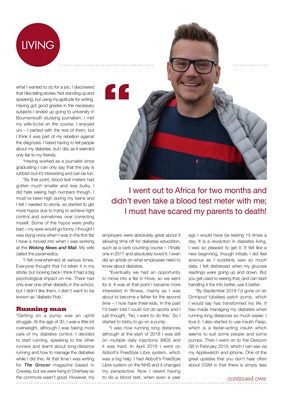
LIVINGLIVING
what I wanted to do for a job, I discovered
that I like telling stories. Not standing up and
speaking, but using my aptitude for writing.
Having got good grades in the necessary
subjects I ended up going to university in
Bournemouth studying journalism. I met
my wife-to-be on the course. I enjoyed
uni - I partied with the rest of them, but
I think it was part of my rebellion against
the diagnosis. I hated having to tell people
about my diabetes, but I did, as it seemed
only fair to my friends.
"Having worked as a journalist since
graduating I can only say that the pay is
rubbish but it's interesting and can be fun.
"By that point, blood test meters had
gotten much smaller and less bulky. I
did hate seeing high numbers though. I
must've been high during my teens and
I felt I needed to atone, so started to get
more hypos due to trying to achieve tight
control and sometimes over correcting
myself. Some of the hypos were pretty
bad - my eyes would go funny. I thought I
was dying once when I was in the first flat
I have a moved into when I was working
at the Woking News and Mail. My wife
called the paramedics.
"I felt overwhelmed at various times.
Everyone thought that I'd taken it in my
stride, but looking back I think it had a big
psychological impact on me. There had
only ever one other diabetic in the school,
but I didn't like them. I didn't want to be
known as 'diabetic Rob.'
Running man
"Getting on a pump was an uphill
struggle. At the age of 30, I was a little bit
overweight, although I was taking more
care of my diabetes control. I decided
to start running, speaking to the other
runners and learnt about long-distance
running and how to manage the diabetes
while I did this. At that time I was writing
for The Grocer magazine based in
Crawley, but we were living in Chertsey so
the commute wasn't good. However, my
employers were absolutely great about it
allowing time off for diabetes education,
such as a carb counting course - I finally
one in 2017 and absolutely loved it. I even
did an article on what employees need to
know about diabetes.
"Eventually we had an opportunity
to move into a flat in Hove, so we went
for it. It was at that point I became more
interested in fitness, mainly as I was
about to become a father for the second
time - I now have three kids. In the past
I'd been told I could not do sports and I
just thought, 'No, I want to do this.' So I
started to lobby to go on a pump.
"I was now running long distances
although at the start of 2018 I was still
on multiple daily injections (MDI) and
it was hard. In April 2018 I went on
Abbott's FreeStyle Libre system, which
was a big help. I had Abbott's FreeStyle
Libre system on the NHS and it changed
my perspective. Now I resent having
to do a blood test, when even a year
ago I would have be testing 15 times a
day. It is a revolution in diabetes living,
I was so pleased to get it. It felt like a
new beginning, though initially I did feel
anxious as I suddenly saw so much
data. I felt distressed when my glucose
readings were going up and down. But
you get used to seeing that, and can start
handling it the info better, use it better.
"By September 2018 I'd gone on an
Omnipod tubeless patch pump, which
I would say has transformed my life. It
has made managing my diabetes when
running long distances so much easier. I
love it. I also started to use insulin Fiasp,
which is a faster-acting insulin which
seems to suit some people and some
pumps. Then I went on to the Dexcom
G6 in February 2019, which I can see via
my Applewatch and iphone. One of the
great upsides that you don't hear often
about CGM is that there is simply less
continued over
I went out to Africa for two months and
didn't even take a blood test meter with me;
I must have scared my parents to death!
"